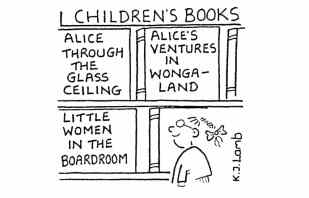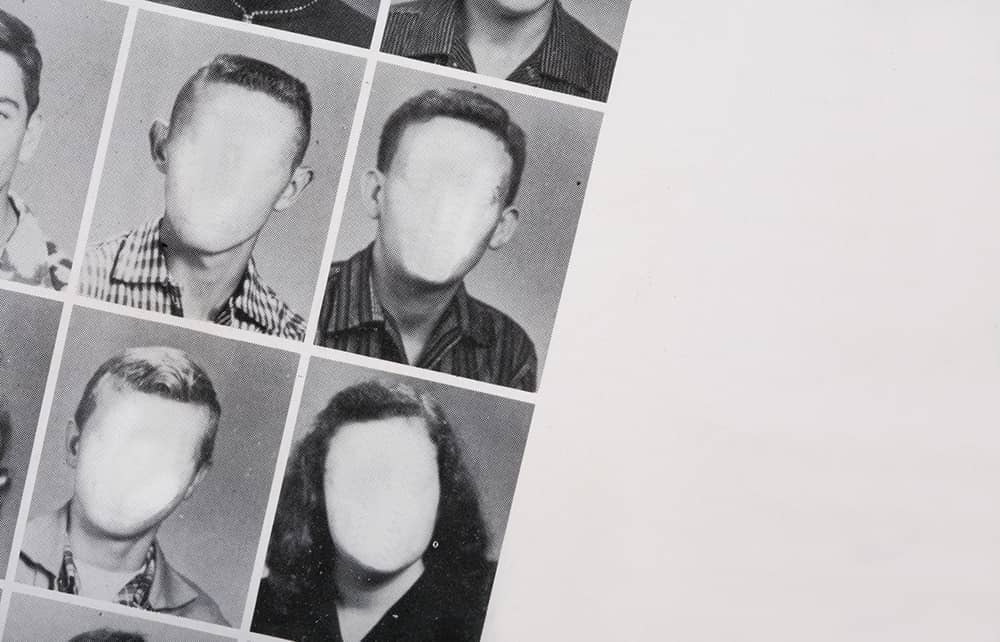T here’s no need for a mirror at school reunions. Just look all around you to see the cruel effects of anno domini on your old contemporaries – and don’t fool yourself that you alone have miraculously dodged the hair-thinning, waist-expanding horrors of middle age.
Is that really the semi-divine girl who scored a modelling contract in her first term in the sixth form and was in a Nivea advert in Elle? Can that be the Brad Pitt of the Remove – the one who had sex before first lesson every morning? Where has the plumpness in her dewy lips fled to? How far back along his scalp have the golden ropes of hair retreated?
I’m certainly not one to speak. When I went back to the 20th-anniversary reunion of my year at Westminster School, an old acquaintance said to a friend of mine: ‘Is Harry OK?’
‘Yes – he’s fine. Why do you ask?’ my friend said.
‘Oh good – the chemo’s working then?’
I had shaved my remaining hair off that morning in a vain attempt to look stylish rather than merely bald.
The first few reunions after leaving school are thrilling. ‘There’s old Christo! I haven’t seen him since he went to Cambridge.’

Then, over the years, you realise why you don’t keep up with old Christo. The interests you shared when you were 16 – Jimi Hendrix, shyness with the opposite sex, a feigned indifference to academic work – all slip away with the passing years. By the age of 36, your grown-up characters are exposed, in all their maturity, to each other – and it’s clear that they aren’t compatible.
Still, there are compensations in that exposed maturity. You’re more confident and honest. Gone is the brittle carapace of unsmiling coolness the adolescent male builds up against the terrors of growing up.
At that same 20-year reunion, I fell into a sincere, revelatory conversation with one of the most popular boys in my year.
‘School must have been wonderful for you,’ I said. ‘I remember you always being surrounded by girls.’
‘Yes,’ he replied, deadpan. ‘I talked to lots of them. But I never once came freely in their company while I was at school.’
You realise why you don’t keep up with old Christo. The interests you shared all slip away
I wasn’t quite sure what that meant. But it was the first comforting sign that evening that the Cool Kids – whom I had longed to belong to – didn’t have the James Dean-meets-Flashman smooth ride I thought they’d had. I’d been comparing my roiling, nerve-wracked inner self with their sublimely relaxed outer selves.
The coolest boy, who did have loads of girlfriends at school, hadn’t made it to the reunion. But his wife, also in our year, had.
‘Is Robbie coming tonight?’ I asked her.
‘You must be joking!’ she said. ‘He hated this place.’
‘But he was the coolest boy in school!’
‘Yes, but he’s still cross that the teachers didn’t push him hard enough.’
Manna from heaven to the school nerd! Could it really be true? Could all those hours learning Greek verbs instead of smoking cigarettes with girls in the café by St James’s Park Tube station have been worthwhile?
I still don’t think so. After all, there was plenty of time in those long hours after school to smoke cigarettes with girls and learn my Greek verbs. Coolness and intelligence aren’t mutually exclusive – just look at Tom Stoppard.
But, still, school reunions do bring consolation – or a kind of schadenfreude – along these lines. And it is eternally interesting to find out what happened to the boy genius in your Latin set and the crazy-eyed loner with the too-short trousers in General English. The really clever ones tend not to be suited to the modern world, unequipped with the unintellectual, rat-like cunning to climb the cursus honorum of adult life.
When I was at Westminster, I tried to read A Dance to the Music of Time by my great-uncle Anthony Powell. I was too young and gave up halfway through the second volume. I tried it again – and finished it – at university. And I regularly reread it, astonished by how perceptive Uncle Tony was about the trajectory of teenage characteristics into their middle-aged incarnations.
The humourless, ambitious types – like Powell’s Widmerpool – do seem to succeed in a stolid, gilt-edged way. They tend to turn up at the reunions, too, with an admirable sense of duty to the old place. I’m not yet old enough to see – and wickedly enjoy – the implosion of my dreary contemporaries that Widmerpool suffers at the end of the novel.
The wild ones – poleaxed by drugs and mental illness – don’t come to the reunions. One of them, a planet-brained boy and a friend during our first term when we were both shy, bookish 13-year-old dwarfs, killed himself a year or two ago, his youthful promise unable to find a place to develop in the grown-up world.
It’s not all gloom and doom. I still go back to reunions and now enjoy them – but I always make sure I’m with a great old friend. That way, together we can simulate shock at the changes to the school: ‘My God, they’ve put new doors on the boys’ bogs!’
And we realise how spoilt we were – how we took for granted having Westminster Abbey as our school chapel.
Most of all, it is unnerving – and occasionally thrilling – to time-travel, with at least some of the original cast, back to the place where your thoughts and sensations were, even if unformed, at their most powerful.
Et Tu, Brute?: The Best Latin Lines Ever by Harry Mount and John Davie is out on 13 October.






Comments